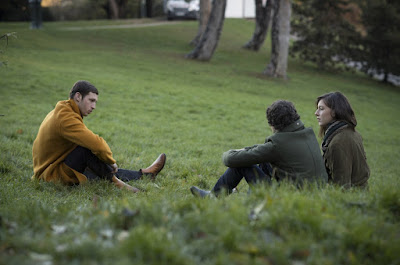The movie also boasts a first-rate cast, each of whom uses whatever screen time he or she has (some roles are very brief) to nail character, while keeping us alert and often pretty delighted with what we see and hear.
This is the first of Mr. Mazziotti's movies I've seen (the filmmaker is shown below) and the first he has both directed and written, and it's good enough for TrustMovies to hope for more. However, it's only his third film in 20 years, so I am not holding my breath.
As I finished watching the film and then noted the many famous cast members listed in the end credits, I immediately went back to the beginning of the film so I could pick out certain actors. But then I quickly found myself enjoying the witty dialog and performances so much that I just kept watching. Had there been more hours in my day, I'd have viewed it all a second time right on the spot.Mr. Robinson (shown below) looks at times enough like a younger version of Mr. Sadoski that the two could almost be related, and since one of the movie's themes concerns identity, mimicry and character, this certainly adds to the fun.
Further, as much as these two g uys are clearly attracted to each other, the question keeps cropping up whether one of them is a sociopath or merely a mimic, so their physical, as well as psychic connection allows for a maximum of homoerotic (though not homosexual) frisson. Both actors play into all this with considerable finesse and zest.
Sociopaths seem just about every-fucking-where in our current movies and TV, and Mazziotti makes wonderful fun of all this via so many of the movie's various characters calling humorous attention to the fact. Like serial killers (even more prevalent in our entertainment culture) that exist in fiction exponentially more than in real life, sociopaths too are maybe a tad over-rated and over-exemplified these days. (On the other hand, we've just finished four years of a U.S President who is one, so maybe this is understandable.)
Stylistically the filmmaker tries some tricks that mostly work -- moving from color to black-and-white, and using a fun clip from Gaslight. He also breaks the fourth wall and, in one scene featuring M. Emmet Walsh and Doug Plaut, he breaks a lot more. Gina Gershon (above, left) and Austin Pendleton (below, right) each get their own fun camero, too, and Matthew Maher is especially good in the role of restaurant owner/bartender.
Mostly, though, the movie belong to Sadoski and Robinson, and these two score nicely. If you're expecting some big reveal at the finale, don't. There's a little something, but fortunately, Mazziotti's doesn't make too much of it. Or of anything much else, really. This is a small little indie film that, in its own way, simply delivers its ideas and entertainment with enough wit and skill to pass muster.
From Gravitas Ventures and running, as I say, just 82 minutes, The Mimic opens in theaters in limited release and via VOD today, Friday, February 5. Take a chance, particularly if that cast intrigues you. Click here for more information.


























































